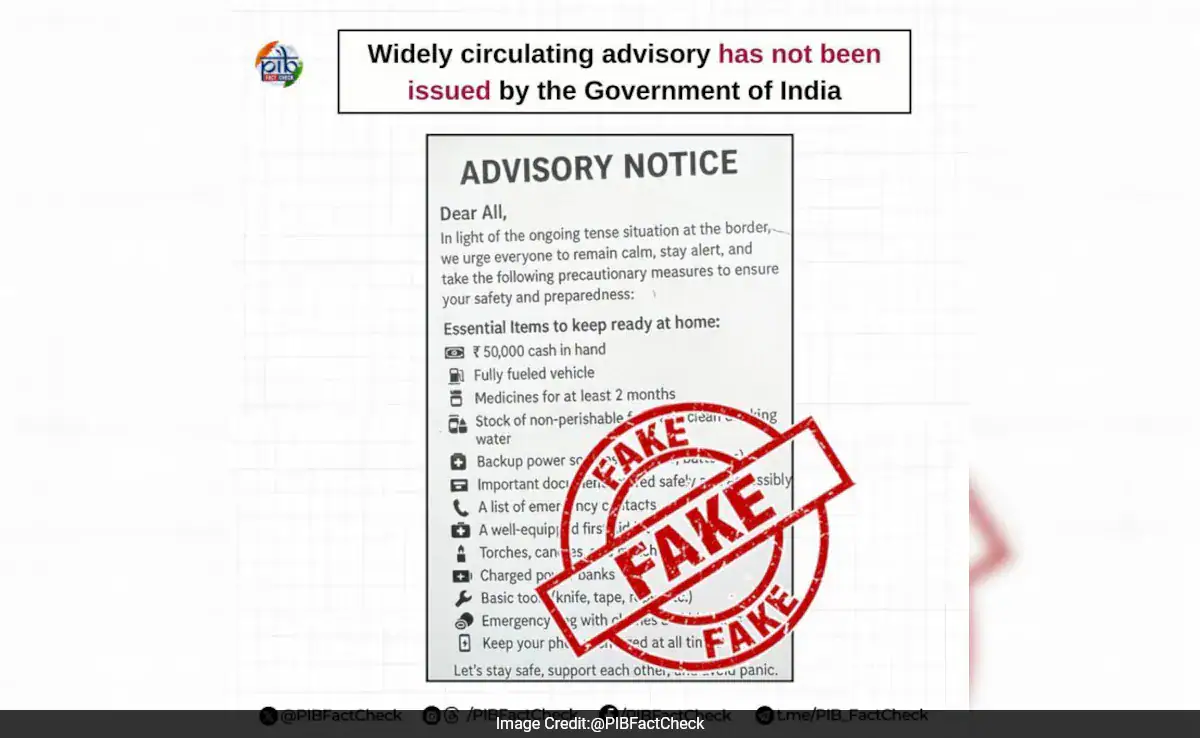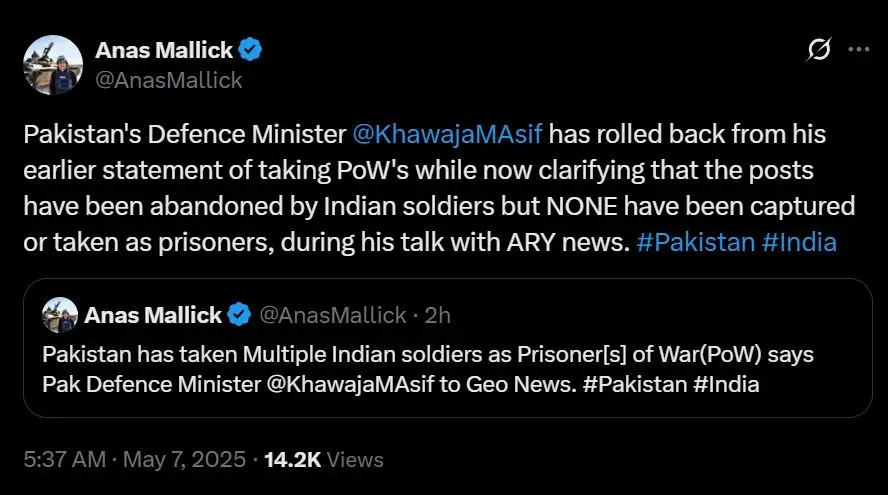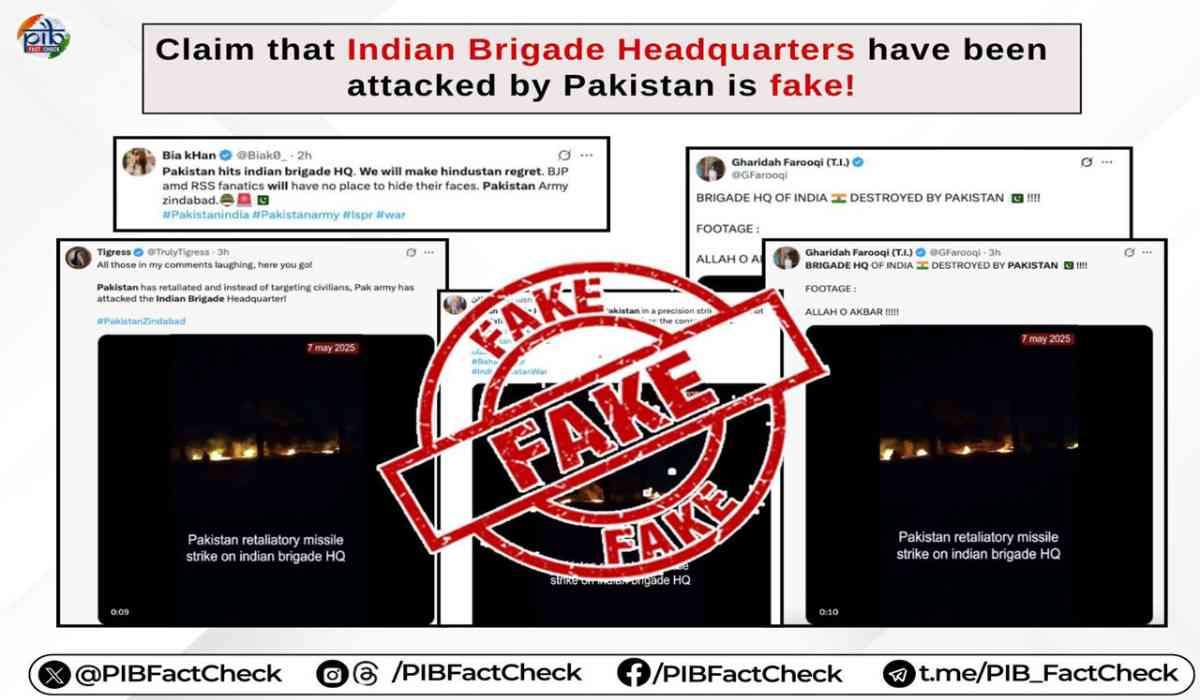In the early hours of May 7, 2025, India launched a bold and strategic operation—Operation Sindoor—targeting nine terrorist sites across Pakistan and Pakistan-occupied Jammu and Kashmir (PoJK). These precision missile strikes were conducted in direct retaliation to the Pahalgam terror attack, which killed 26 innocent civilians, including Indian and Nepali nationals. The operation was executed by the Indian Armed Forces in a measured and non-escalatory manner, avoiding any military installations and focusing solely on terrorist infrastructure.
While the Indian Army maintained clarity and restraint, Pakistan’s establishment, media, and online propaganda ecosystem spiraled into a misinformation frenzy, pushing a flood of fake news, old videos, unrelated images, and doctored claims to distort the truth and mislead both domestic and international audiences.

Key Targets Hit by Operation Sindoor
Operation Sindoor focused on strategic terrorist hubs known to be operating under the protection or negligence of Pakistan’s authorities. The Indian Armed Forces successfully struck:
-
Jaish-e-Mohammed (JeM) bases in Bahawalpur
-
Hizbul Mujahideen camps in Muzaffarabad
-
Lashkar-e-Taiba (LeT) facilities in Muridke
According to Indian military sources, no military facilities were targeted, and all personnel involved in the operation returned safely.

Pakistan’s Disinformation Response: A Timeline of Lies
Immediately after the successful strikes, Pakistan’s military-backed media and social media accounts began a coordinated disinformation campaign aimed at countering the humiliation of being caught off-guard.
Fake Claims Circulated by Pakistani Officials and Media:
-
Six Indian Aircraft Downed: Pakistani journalist Hamid Mir bizarrely increased the number of Indian jets allegedly downed—from 2 to 6—within a few hours, with no proof.
-
Indian Soldiers Abandoning Posts: Pakistan’s Defence Minister claimed Indian soldiers were abandoning their positions, again without evidence.
-
Indian POWs Taken: The same minister claimed Pakistan had captured three Indian prisoners, a statement he later retracted.
-
Missile Strikes on Indian Territory: False reports of Pakistan firing missiles on 15 Indian locations were widely shared on social media.
-
Srinagar Airport and Brigade HQ Attacked: Multiple accounts claimed that key Indian military infrastructure had been destroyed. These claims were fact-checked and debunked by the Press Information Bureau (PIB).
Score is now six. One Indian Mig29 destroyed few moments ago. https://t.co/otMWfTvVzq— Hamid Mir حامد میر (@HamidMirPAK) May 7, 2025
Major Fake News Debunked
India’s official agencies and independent fact-checkers were swift in dismantling Pakistan’s disinformation with credible evidence.
1. MiG-29 Crash Image Is Old
A photo showing a crashed IAF MiG-29 was falsely shared with the claim that it was shot down by Pakistan. The image, however, was from an unrelated 2024 crash in Barmer, Rajasthan.
An old image showing a crashed aircraft is being re-circulated by pro-Pakistan handles in various forms in the current context of #OperationSindoor#PIBFactcheck
✔️The image is from an earlier incident involving an Indian Air Force (IAF) MiG-29 fighter jet that crashed in… pic.twitter.com/6NJQvRH7KJ— PIB Fact Check (@PIBFactCheck) May 7, 2025
2. Fake Videos of Srinagar Airbase Attack
In a video shared by several pro-Pakistan handles, it is being falsely claimed that the Pakistan Airforce has targeted Srinagar airbase#PIBFactCheck
❌ The video shared is old and NOT from India.
✅The video is from sectarian clashes that took place in the year 2024, in… pic.twitter.com/vPmMq4IWdE— PIB Fact Check (@PIBFactCheck) May 7, 2025
Multiple Pakistani social media handles circulated an old video from sectarian violence in Khyber Pakhtunkhwa (2024), falsely claiming it showed Pakistan's retaliation targeting Srinagar Airbase.
3. Photos of Aircraft Wreckage Are Misleading
Photos depicting what was claimed to be downed aircraft were actually of drop tanks, not parts of any destroyed plane.
4. Missile Strike Footage is Iranian
A missile video shared with the caption "Live visuals from Operation Sindoor" was traced back to Iranian missiles hitting Israel in 2024, not the recent operation.
5. Brigade Headquarters Not Attacked
Social media posts falsely claims that Pakistan destroyed Indian Brigade Headquarters.#PIBFactCheck
❌ This claim is #FAKE
✅ Please avoid sharing unverified information and rely only on official sources from the Government of India for accurate information. pic.twitter.com/9W5YLjBubp— PIB Fact Check (@PIBFactCheck) May 7, 2025
Claims that Pakistan destroyed an Indian Brigade HQ were found to be completely false, with PIB confirming there was no such attack.
The Fake Social Media Ecosystem Fueling Pakistan’s Narrative
A number of fake social media accounts, often posing as Indian Army officials, were actively spreading Pakistani propaganda.
Some of the Fake Accounts Identified:
-
@Arrunp2810 – Posing as Admiral Arun Prakash (Retd)
-
@pinaka_av184 – "Colonel Hathi"
-
@MyselfAaravi
-
@IndianMajGen – “Maj Gen Bishamber Dayal”
-
@Tiju0Prakash – “Tejasswi Prakash”
These accounts, as flagged by fact-checker Mohammed Zubair and others, were operating in close alignment with Pakistan's Inter-Services Public Relations (ISPR).
“ARY News from Pakistan is sharing images of old and unrelated incidents as latest,” Zubair posted on X (formerly Twitter), highlighting how state-backed media outlets were pushing false narratives.
Beware! These are Pakistani propaganda accounts pretending to be Indian Army Personals.
Don't amplify their tweets. pic.twitter.com/uhoYFDvbUM— Mohammed Zubair (@zoo_bear) May 7, 2025
India's Stand: Strategic Clarity and Responsible Communication
In contrast to Pakistan’s chaotic and false counterclaims, India maintained a measured, confident, and responsible communication strategy:
-
The Indian Army confirmed the success of Operation Sindoor without resorting to bombast or misinformation.
-
PIB and All India Radio News proactively debunked fake videos, images, and posts within hours.
-
Government advisories urged citizens to rely only on official sources and avoid circulating unverified content.
Pakistani media is circulating a photo claiming that the Pakistan Air Force shot down 2 Indian aircraft. This is fake news.
Fact: This is 1-year-old photo of an IAF MiG fighter jet crash in Rajasthan in 2024.
Share this fact widely. Do not fall for Pakistan's psychological… pic.twitter.com/YrvNtXF690— Anshul Saxena (@AskAnshul) May 6, 2025
The Bigger Picture: Why Disinformation Is a Key Weapon in Asymmetric Warfare
Pakistan’s reaction underscores the evolving nature of modern conflict, where information warfare is used as a primary tool to shape perception, morale, and diplomatic narratives. With conventional retaliation unfeasible without risking escalation, disinformation becomes a weapon of choice.
Key Tactics Observed:
-
Flooding social media with doctored visuals
-
Promoting fake handles posing as military officers
-
Recycling old videos to pass them off as recent
-
Creating a fog of war to mislead both domestic audiences and international observers
Trust Official Channels, Reject Disinformation
Operation Sindoor has shown that India’s military remains both vigilant and precise, responding to threats with surgical accuracy and strategic restraint. Pakistan’s response—a mix of misinformation and digital theatrics—reflects not just its inability to respond militarily, but also a desperation to control the narrative.
As the situation develops, citizens are advised to stay vigilant, fact-check before sharing, and follow only verified and official sources for updates.
🛑 #PIBFactCheck: “Please avoid sharing unverified information and rely only on official sources from the Government of India for accurate updates.”
With inputs from agencies
Image Source: Multiple agencies
© Copyright 2025. All Rights Reserved Powered by Vygr Media.


















